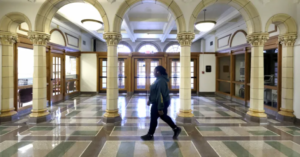Adams 14 sues State Board of Ed, challenges accountability process
4 min read
The Adams 14 school district has sued the state to rework the rules of a critical hearing that could determine the district’s fate.
Among other things, the district wants more time before the State Board of Education in April to present arguments for maintaining control of the district in any new improvement plan. It filed the lawsuit in Denver District Court earlier this month, and last week added a request to stop the hearing altogether until the State Board changes its process. On Tuesday, state attorneys asked the court to dismiss the case.
The lawsuit argues that the State Board’s procedures violate the law. The state said its hearings aren’t subject to the cited law governing administrative hearings and that it already provides a fair process.
Typically, the hearings for schools or districts facing state orders over low performance last a little more than two hours. The State Board hears 30 minutes of evidence and arguments from Department of Education staff, then 30 minutes from the school’s or district’s officials.
State Board members consider only information presented in the hearing and a report and recommendations from a panel of experts who are asked to visit the site. State Board members then discuss recommendations before voting on a management plan and other orders for the district.
In 2018, Adams 14 became the first district the state required to hand over daily management to an outside group for consistently failing to improve student performance. The State Board intended to provide stability and make improvements to offer students a better education.
This school year, the Adams 14 board, advised by its own superintendent, terminated the contract with its outside manager, MGT. Because the district is no longer following the 2018 state orders, the State Board then ordered a new review and will hear the resulting recommendations for an improvement plan at a hearing in April.
Joe Salazar, an attorney representing Adams 14, said Thursday that a 30 minute limit is disrespectful given the weight of the decisions and consequences.
The lawsuit seeks a more court-like process with witnesses, cross examination, and the ability to challenge evidence. It should last as long as it takes, he said.
“There should be a collaboration happening here,” Salazar said. “It’s almost as if the state board looks down at local government, and it shouldn’t.”
State officials said the lawsuit indicates a misunderstanding of the state’s accountability laws.
“The claims in the lawsuit don’t make much sense, and the whole thing just takes focus away from where it should be, which is working together to improve outcomes for the students in Adams 14,” said Dana Smith, a spokesperson for the Colorado Department of Education. “Under the Education Accountability Act, the State Board of Education is obligated to direct action to improve student outcomes.”
Among other claims, the lawsuit argues that the state review panel — the group of experts tasked with visiting the district and making recommendations — should not consider state test data from the past two years, nor be allowed to review the district’s leadership.
The lawsuit argues that because school boards are locally elected, and they alone hold the responsibility of hiring a superintendent, the State Board cannot question who is in those leadership positions.
Salazar said Tuesday that he doesn’t believe it is fair to judge the current Adams 14 board members or Superintendent Karla Loria, unless they were strictly judged on what they’ve done after MGT left the district less than a month ago.
“I reject this idea that Karla’s had managerial authority,” Salazar said.
And as far as the board, Salazar said the board felt pressured to rubber stamp any recommendations from MGT, for fear of retribution from the state.
The lawsuit challenges the state’s school accountability law itself, because it requires that the state send a panel to review low-performing schools and districts and to make recommendations, and even outlines what they are to consider.
While the options open to the State Board don’t include replacing a school board or superintendent, Salazar said that using assessments of local leadership to recommend something like dissolving a district amounts to the same thing.
The state argued that it has always been its responsibility to observe and evaluate district performance and leadership, and that it doesn’t infringe on local control.
“The simple act of observing district leadership and reporting on those observations in no way diminishes the local board’s ability to implement its educational program,” the state’s motion states.
The lawsuit also seeks to remove State Board member Steve Durham from procedures, arguing that he is biased. Salazar made that argument before a State Board meeting last month, but State Board members dismissed the claim as offensive and said that as elected officials they were allowed to voice their opinions.
Salazar argues that for accountability hearings, which he says should be conducted more like court hearings, State Board members should be impartial.
This article was originally posted on Adams 14 sues State Board of Ed, challenges accountability process







